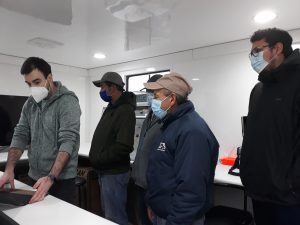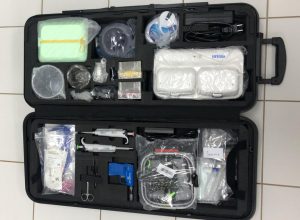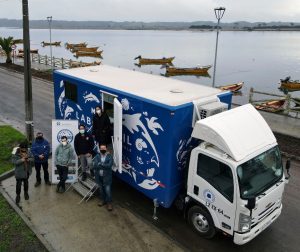The MACH-SATREPS project presented its mobile laboratory and equipment for monitoring algae in the field to Nehuentue mussel farmers.
Due to the pandemic decreed by the spread of the SARS-CoV2 virus and the sanitary restrictions that have limited meetings and free movement for a year and a half, the MACH project had “frozen” its face-to-face communication and outreach activities with the general public, local communities, fishermen and shellfish farmers. But on June 24th, 2021, we were able to resume these activities “in situ” with a small group of mussel farmers from the Nehuentue cove, commune of Carahue in the Araucanía region.
The meeting was arranged by the president of the association of fish farmers, Mr. Emilio Sepúlveda. It was attended by five mussel farmers and the person in charge of fisheries and aquaculture of the municipality of Carahue, Mr. Humberto Avilés. The activity included a short introductory talk about the project and then a visit to the Mobile Laboratory (Labo-Mobile) to present its equipment and the “Suitcase-Lab,” a portable suitcase equipped with everything necessary to monitor potentially harmful microalgae, producers of algal blooms (FANs), which is part of the technology transfer between researchers from Japan and Chile. The Applied Microbial Ecology Laboratory (EMALab) team, directed by Dr. Milko Jorquera from the Universidad de la Frontera, where both the Labo-Mobile and the Suitcase-Laboratory are hosted, participated in this activity.

Presentation of equipment to Nehuentue shellfish farmers.

Suitcase-Lab presented to local shellfish farmers as part of the field equipment for algae monitoring.

EMALab (UFRO) team that participated in the activity with the Labo-Mobile.